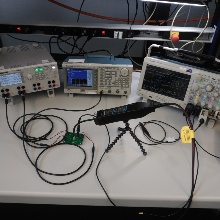Current information for interested students
Currently, all places in the summer semester 2024 for this lab course are booked. Please inform yourself about the courses offered by other institutes of the Department of Electrical Engineering.
With kind regards
Michael Bosch
IMPORTANT INFORMATION - The lab course "Dynamic and application-related measurement techniques for fast switching power transistors" will be offered as on-site course with physical presence of students on the premises of ILH. The lecturer reserves the right to change the mode of organization in order to comply with the prevailing frame conditions for on-site courses.
| Information | |
|---|---|
| Course of studies | M.Sc. Electrical Engineering and Information Technology, M.Sc. Electrical Engineering University of Stuttgart |
| Objective |
The objective of the lab course "Dynamic and application-related measurement techniques for fast switching power transistors" is to impart knowledge on measurement methods as they are used in current industrial and university research to measure switching processes in fast switching power transistors. The students learn how to safely use measuring devices, how to use different probes and how the measurement results are to be interpreted after weighing different influencing parameters. |
| Content and dates |
The following topics are discussed in these lab course:
|
| Organization |
There will be an information event on the lab course on Thursday, 11 April, 2024 at 11:30 am. The subjects of the experiments are explained and organizational questions answered. An email as information will be sent in advance to all students who have registered for the lab course in the C@MPUS system of the University of Stuttgart. After a laboratory safety briefing, there will be a theory unit on wide-bandgap power transistors. The practical experiments are then carried out every two weeks. Each experiment consists of the preparation of the experiment, the implementation of the experiment and the interpretation and evaluation of the measurement results obtained. All relevant measurement results of the tests are to be summarized in documentation and then presented in the form of a short presentation. Further organizational information will be announced in the ILIAS course of the lab course. |
| Requirements |
|
| Location | University of Stuttgart, Campus Vaihingen, Pfaffenwaldring 47, room 1.161 (ETI 1, 1. floor) |
| Number of participants | 6 groups of 2 students |
| Registration |
Registration takes place via the University of Stuttgart's C@MPUS system. Please register here for the lab course, as this is how the grade and credit points are entered after successfully completing the course. The registration is expected to be activated until April 15, 2023, 00:00. A selection may be made based on qualifications and the time of registration. |
| SWS | 4 in summer term 2024 |
| Exam | The grade of the lab course is based on general methods of working, preparation to the sessions as well as the detailed report and the final presentation. |
| Contact | M.Sc. Michael Bosch |

Michael Bosch
M.Sc.Research Assistant


